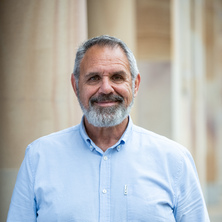
The focus of a new Centre of Research Excellence (CRE) led by The University of Queensland and the Institute for Urban Indigenous Health (IUIH) is to develop the next generation of health researchers and build research collaboratives with urban Aboriginal and Torres Strait Islander communities nationally.
Supported by $2.5 million in National Health and Medical Research Council funding, the Centre of Research Excellence in Urban Indigenous Health will connect existing partnerships and infrastructure between UQ’s Poche Centre for Indigenous Health and IUIH.
Pitjantjatjara and Nukunu man and Director of UQ’s Poche Centre for Indigenous Health Professor James Ward said the CRE is an opportunity to improve health outcomes, enhance models of care, and influence health systems impacting on the health and wellbeing of urban Aboriginal and Torres Strait Islander peoples.
“The life expectancy for Aboriginal and Torres Strait Islander people born in a major city is approximately eight years shorter than for non-Indigenous Australians,” Professor Ward said.
“Representing 60 per cent of the total Indigenous population Urban Aboriginal and Torres Strait Islander Australians experience high rates of mental health conditions, chronic respiratory disease, cardiovascular disease, and diabetes.
“Without research into health inequities faced by Aboriginal and Torres Strait Islander people, we’ll never close the gap.”
Institute for Urban Indigenous Health Chief Executive Officer, proud Cobble Cobble / Wakka Wakka man Adrian Carson said the CRE will generate the evidence required to push current mainstream health system thinking and set up an effective integrated health care system.
“Until now, urban Indigenous health in Australia has endured major gaps in research effort and investment,” Mr Carson said.
“In developing a research agenda that reforms the health care system in partnership with our expert Aboriginal Community Controlled Health Service partners, we can generate new knowledge to transform health care delivery for urban Aboriginal and Torres Strait Islander peoples and contribute significantly to narrowing this gap.
“Urgent research is needed.”
Key research areas of the CRE include a focus on issues requiring systemic change such as data linkage between primary and tertiary care, mental health services, hospital in the home, rehabilitation, cancer care, maternity care, and progressing technological advancements.
Media: Kirsten O’Leary, UQ Communications, k.oleary@uq.edu.au, +61 (0)412 307 594



